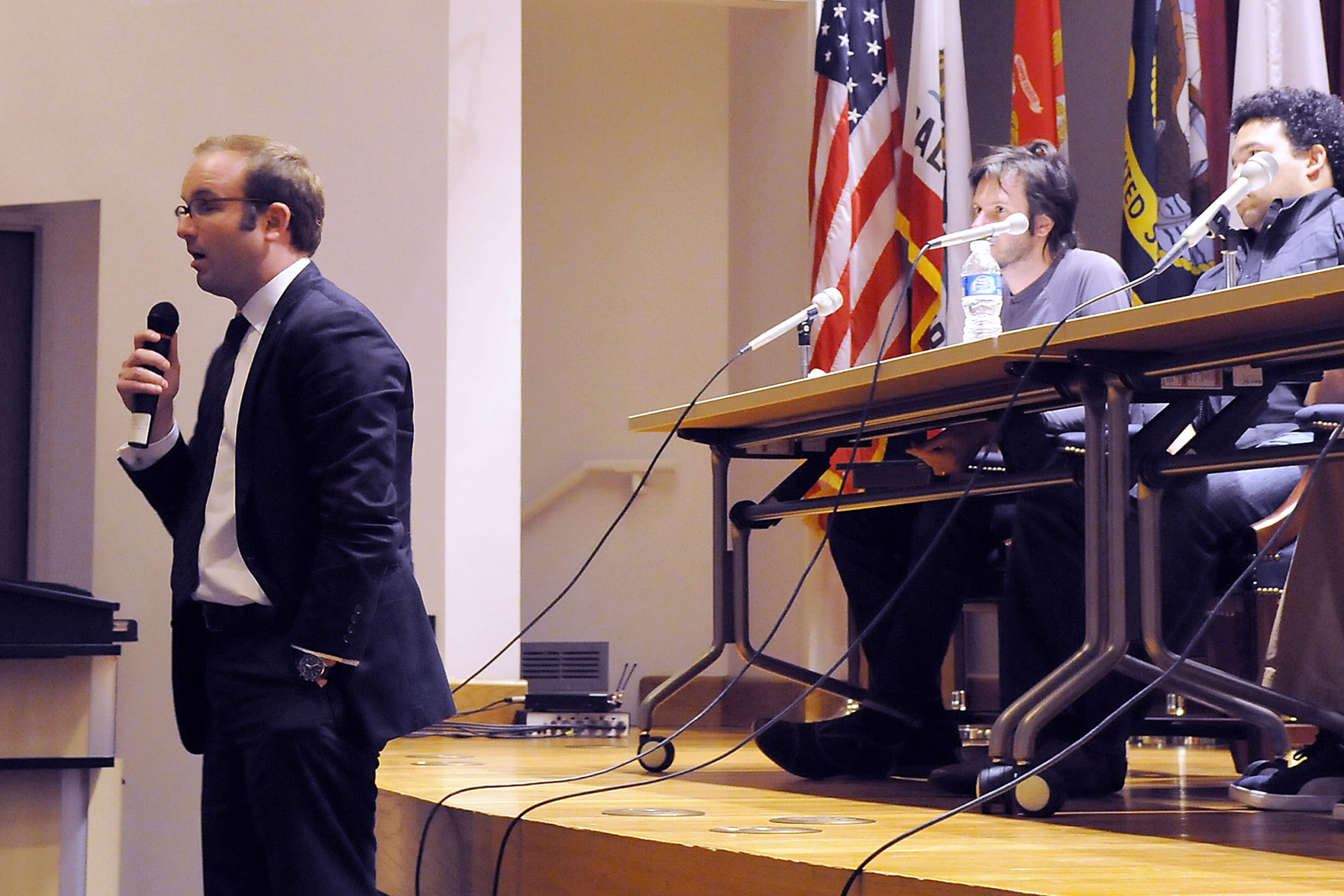Healing the wounds of war

The ancient Greeks knew the battlefield could leave emotional scars, and they had a distinctive way of dealing with it: They put on a play. Dramas about Achilles and Ajax showed these mythological war heroes suffering from the “divine madness” caused by combat — known today as post-traumatic stress disorder.
“Scholars say Greek theater helped citizen-soldiers reintegrate with civilian life after being at war. It was a communal opportunity to acknowledge the truth of their experience on the battlefield,” says UC Irvine alumnus Bryan Doerries, M.F.A. ’01, a New York writer, translator and director.
After reading news reports about soldiers returning from Iraq and Afghanistan with deep psychological wounds, Doerries got “this crazy idea” that the ancient texts also might help these modern-day veterans. In 2008, he founded Theater of War, a production company that stages his own translations of Greek and Roman plays for military audiences.
“This is about theater as a vehicle for something much bigger than a performance,” Doerries says. “When veterans see their own lives reflected in ancient stories, they open up and talk about things they might not have shared with anyone. Maintaining one’s humanity in the face of war is something people have been struggling with for thousands of years.”
Today, after more than 100 readings for about 20,000 service members, Theater of War doesn’t seem so crazy after all. Many veterans have been moved to tears by the performances. The Pentagon even awarded the company $3.7 million to give readings at 50 military installations across the U.S. and Europe.
The program features excerpts from Sophocles’ Ajax and Philoctetes, which show Greek warriors “struggling under the weight of their psychological and physical injuries,” Doerries says. Ajax commits suicide after plotting to kill his commanding officers but, under a trance by the war goddess Athena, slaughters farm animals instead.
There are no costumes, no sets — only five actors seated at a table. About 70 performers have participated so far, including film and stage veterans Paul Giamatti, Lili Taylor, David Strathairn and Charles S. Dutton.
After the reading, Doerries invites a panel of five members of the military community onstage: an active-duty soldier who has served in Iraq or Afghanistan, a combat veteran, a military spouse or family member, a military chaplain and a mental health professional.
“They respond with their gut to what they’ve seen,” Doerries says. “Then we open the discussion up to the audience. It’s a 2½-hour event, and the 50-minute performance is a pep rally for the discussion.
“People get up and say very personal things. They get emotional. One Vietnam veteran came up to me and said, ‘Bryan, the fact that PTSD has been around since B.C. makes me feel less alone.’ As an artist, it’s rare to feel you’re doing anything socially meaningful with your craft. But we get immediate feedback. There’s an overwhelming sense this is making a difference.”
In some ways, Doerries has prepared for his role as Theater of War director all of his life.
“I’m the son of two psychologists. I grew up in a military town — Newport News, Virginia. When I was 7, I acted in Euripides’ Medea. If you take those three things together, you see how I got where I am today,” he jokes.
While earning his master’s in directing at UCI’s Claire Trevor School of the Arts, he directed six translations of Greek plays, including Ajax. He’d found his calling.
“Bryan excelled at UCI. Always soft-spoken and persuasive, he has a remarkable ability to bring people together,” recalls Keith Fowler, UCI drama professor and head of directing.
Doerries says Fowler inspired him to explore the social impact of theater. “Keith told me, ‘You have everything going for you, but one thing is missing: the humanistic connection between your work and real people.'”
In response, he joined ArtsBridge America (then directed by Fowler) and taught drama in Santa Ana K-12 schools.
“That was the beginning of this journey,” says Doerries, who plans to return to campus in February to lead a master class on military conversations with the community. “Now my work is completely about the people for whom we are telling the story.”
Doerries hopes to expand his concept — and his audience — by staging dialogues on other social issues. The troupe is performing Prometheus in Prison for case workers, corrections officers and other prison staff, and Sophocles’ Women of Trachis for those who provide hospice and end-of-life care.
He’s also including civilian audiences in Theater of War readings to bridge the gap between civilian and military culture.
“If I don’t do anything else, this has been an amazing run,” he says. “The message I’m trying to convey to veterans is: ‘You’re not alone in this room. You’re not alone in this country or this world. You’re not alone across time.'”
Originally published in ZotZine Vol. 3, Iss. 3